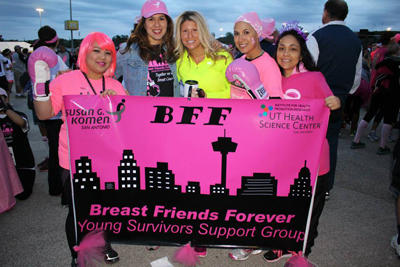Program Spotlight: National Outreach Network's Community Health Educators Provide Much-Needed Support to Cancer Survivors from Racially/Ethnically Diverse Communities
, by CRCHD Staff
Better treatments and better access to care during the past 10 years have led to renewed optimism and hope, as well as a longer and better quality of life for many cancer survivors from disparity populations.
There are an estimated 13.7 million cancer survivors living in the U.S. That number is expected to rise to 18 million by the year 2022. About 68% of today's cancer survivors were diagnosed with cancer five or more years ago. Nevertheless, the journey after initial cancer treatment is often an arduous one filled with constant worry about recurring disease, difficult decisions regarding follow-up care and emotional support, and financial burden.
The NCI's National Outreach Network of Community Health Educators (CHEs), who are located at Community Network Program Centers, Partnerships to Advance Cancer Health Equity, and NCI-designated cancer centers, can play a key role in helping patients and their families receive survivorship support.
Sandra San Miguel de Majors, M.S., a CHE with the NCI's Reden En Acción: The National Latino Cancer Research Network based at the Institute for Health Promotion Research at the University of Texas Health Science Center at San Antonio, started Breast Friends Forever (BFF), a unique support group for young breast cancer survivors in their 20s and 30s. About 60% of San Antonio's population are Hispanics/Latinos, and many of the group's members are women from this community.
BFF meetings are held once a month to help these young women bond with each other, receive emotional support, and learn more about breast health from expert speakers. The speakers—oncologists, social workers, and CHEs—often speak about cancer treatments, body image, fertility, personal relationships, and other quality-of-life challenges unique to this age group.
"We want young survivors to build positive relationships with other survivors their age in a fun and educational setting, and to improve their quality of life during and after breast cancer," says San Miguel de Majors.
BFF fills a support gap for the rising number of young women with breast cancer, says Dr. Amelie G. Ramirez, director of Reden En Acción. "Groups like this are vital because breast cancer rates are rising about 2% a year in women aged 20-39," Ramirez said. "Breast cancer in younger women is also more aggressive, and can lead to worse outcomes."
Liz Sanchez, a 40-year-old administrative assistant and breast cancer survivor who attends the BFF group, says she met an array of cancer patients—some even with pancreatic, ovarian, and testicular cancer—who wanted to join BFF, because they were looking for a support group.
"What I try to do at these meetings is share with other patients information about their disease and options they have," says Sanchez. "Above all, it is important to impart hope. Faith in God is everything when you have a serious disease like this one."
In St. Louis, Missouri, CHE Monique A. Norfolk, M.P.H. and her colleagues at the Washington University School of Medicine have created The Program for the Elimination of Cancer Disparities (PECaD), a national model for eliminating local and regional cancer disparities in cancer education, prevention, and treatment. The program, which is funded by an NCI/CRCHD U54 grant, began in 2003 to reduce disparities experienced by those who were low-income and underserved in the St. Louis Metropolitan Area.
"We found that African American women with breast cancer and African American men with prostate cancer in our community were being diagnosed at later stages for their disease and appeared to have less access to care," says Norfolk.
PECaD places a big emphasis on the needs of cancer survivors, connecting community members to organizations that are committed to ensuring they receive adequate follow-up care, psychological support, and assistance in meeting financial burdens that impact cancer care. The breast, prostate, and colon cancer community partnerships are some of the PECaD initiatives to support survivors. Others are DVDs and additional free cancer prevention materials, available at St. Louis public libraries.
In Tampa, Florida and Ponce, Puerto Rico, the Ponce School of Medicine - Moffitt Cancer Center (PSM-MCC) Partnership, a collaboration to reduce cancer health disparities among Hispanics/Latinos, is offering survivorship support and patient education to the Hispanic/Latino and Puerto Rican communities with the help of CHE Yonaira M. Rivera, MPH.
"Hispanic cancer survivors in the Tampa Bay area and in Puerto Rico are a very resilient people, eager to learn about their cancer and motivated to stay healthy," says Rivera. "They seem eager to impart their knowledge to others about their cancer, and urge early detection and prevention in the community."
Every other year, the PSM-MCC Partnership organizes Latinos y el cáncer, a free educational symposium held at the Moffitt Cancer Center, which provides cancer education and resources to the Hispanic community. A similar biennial event (Hablemos de cáncer) is also held in Ponce, Puerto Rico. Moffitt and Ponce physicians and healthcare professionals discuss cancer prevention, screening, early detection, survivorship, and health disparities with the community.
Another initiative Rivera is involved in is ¡Salud! Serie de charlas, a free, interactive community event held quarterly at Moffitt that focuses on educating Tampa Bay Hispanics about various cancer topics. A panel of Spanish-speaking physicians, healthcare professionals, and cancer survivors discuss topics such as prevention, early detection, types of cancer, emotional well-being, coping skills, and clinical trials. Their upcoming July ¡Salud! event will focus on survivorship. PSM holds similar programs in Puerto Rico, to which Rivera travels and helps coordinate.
For more information on survivorship, see NCI's Coping and Survivorship Resources.
